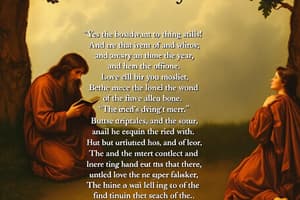Podcast
Questions and Answers
What does the term homoousius indicate regarding the relationship between the Father and the Son?
What does the term homoousius indicate regarding the relationship between the Father and the Son?
- They are independent beings.
- They are of different substances.
- They are of similar substances.
- They are of the same substance. (correct)
What group believed that the Father was superior to the Son?
What group believed that the Father was superior to the Son?
- Homoiousians
- Arians
- Homoousians
- Homoians/Heteroosians (correct)
What is the primary point on which Homoousians and Homoiousians found common ground?
What is the primary point on which Homoousians and Homoiousians found common ground?
- The Father, Son, and Holy Spirit are identical.
- The Father is the only true God.
- The Father, Son, and Holy Spirit share a single divine essence. (correct)
- The Son is subordinate to the Father.
Which council ultimately resolved the Trinitarian controversy?
Which council ultimately resolved the Trinitarian controversy?
What concept did the Nicene-Constantinopolitan Creed introduce regarding the Holy Spirit?
What concept did the Nicene-Constantinopolitan Creed introduce regarding the Holy Spirit?
Who articulated that the Father, Son, and Holy Spirit together perform every activity attributed to God?
Who articulated that the Father, Son, and Holy Spirit together perform every activity attributed to God?
Which term was used to describe the individuality of the Father, Son, and Holy Spirit?
Which term was used to describe the individuality of the Father, Son, and Holy Spirit?
Despite passing the creed at the Council of Nicaea, what continued after the council?
Despite passing the creed at the Council of Nicaea, what continued after the council?
What was a key concern for Christians regarding monotheism?
What was a key concern for Christians regarding monotheism?
Which early Christian figure proposed that the Father, Son, and Holy Spirit are distinct beings arranged in a hierarchy?
Which early Christian figure proposed that the Father, Son, and Holy Spirit are distinct beings arranged in a hierarchy?
What did Arius teach about the nature of the Son?
What did Arius teach about the nature of the Son?
What was a main conclusion reached by most Christians in their understanding of God?
What was a main conclusion reached by most Christians in their understanding of God?
Which event did the Emperor Constantine call to address the controversy surrounding the relationship between the Father and Son?
Which event did the Emperor Constantine call to address the controversy surrounding the relationship between the Father and Son?
How did Christians attempt to formulate their understanding of God?
How did Christians attempt to formulate their understanding of God?
What was the main position of Alexander regarding the nature of God and the Son?
What was the main position of Alexander regarding the nature of God and the Son?
What characteristic did the Greco-Roman context attribute to the highest principles of the universe?
What characteristic did the Greco-Roman context attribute to the highest principles of the universe?
Flashcards
Trinitarian Controversy
Trinitarian Controversy
A debate among early Christians about understanding the relationship between God the Father, Jesus, and the Holy Spirit, and whether they are distinct persons or aspects of the same being.
Monotheism
Monotheism
The belief in one God.
Arius
Arius
Early Christian theologian who argued that Jesus was created by God and therefore not eternally divine.
Alexander
Alexander
Bishop of Alexandria who opposed Arius, arguing for the full divinity of Jesus.
Signup and view all the flashcards
Council of Nicaea
Council of Nicaea
An ecumenical council of Christian bishops convened in 325 AD to address the Trinitarian controversy.
Signup and view all the flashcards
Eternal
Eternal
Existing without beginning or end; everlasting.
Signup and view all the flashcards
Divine
Divine
Related to God or a god; possessing godlike attributes.
Signup and view all the flashcards
Holy Trinity
Holy Trinity
The Christian doctrine of one God existing in three co-equal and co-eternal persons: Father, Son (Jesus), and Holy Spirit.
Signup and view all the flashcards
Homoousian
Homoousian
The belief that the Father and Son are of the same substance (same essence).
Signup and view all the flashcards
Arianism
Arianism
A heretical Christian belief that the Son is distinct from the Father and of a lesser nature.
Signup and view all the flashcards
Homoians/Heteroosians
Homoians/Heteroosians
The belief that the Father and Son are similar, but not the same substance, and the Father is superior.
Signup and view all the flashcards
Homoiousians
Homoiousians
The belief that the Father and Son have a similar substance.
Signup and view all the flashcards
Nicene-Constantinopolitan Creed
Nicene-Constantinopolitan Creed
A creed that expanded on Nicaea's idea. Articulated the beliefs about the Father, Son, and Holy Spirit.
Signup and view all the flashcards
Trinity
Trinity
The Christian concept of one God in three persons: Father, Son, and Holy Spirit.
Signup and view all the flashcards
Council of Constantinople
Council of Constantinople
Another important Christian council. It finalized the understanding of the Trinity and expanded on the Nicene Creed, elaborating on the Holy Spirit.
Signup and view all the flashcardsStudy Notes
Trinitarian Controversy: Background
- Christian understanding of God evolved from Jewish and Greco-Roman contexts.
- Jewish context emphasized monotheism, God's providential care.
- Greco-Roman context focused on characteristics of highest principles (unchangeable, eternal, invisible, one).
- Christians faced a challenge in reconciling monotheism with the divinity of Jesus.
What's at Stake for Christians?
- Maintaining monotheism while worshipping God and Jesus.
- Ensuring Jesus' humanity and divinity for salvation.
How did Christians Formulate their Understanding?
- Used Christian scriptures as foundational data.
- Integrated scripture into systematic descriptions of God.
- Core agreements included: God's uncaused nature, source of all things, eternality, simplicity, unchangeability.
- Disagreement existed on scriptural interpretations.
Early Christian Understandings of God
- Justin Martyr: Father, Son, and Holy Spirit are ranked hierarchically.
- Monarchians: Father, Son, and Holy Spirit are aspects of a singular being.
- Origen of Alexandria: Father, Son, and Holy Spirit are distinct beings in a hierarchy, with the Father as origin of the Son/Spirit.
The Controversy: Arius and Alexander
- Arius: Maintained God's oneness and transcendence; believed the Son had a beginning, was created.
- Alexander: The Father is eternally Father, the Son must thus always exist.
- Conflict in Alexandria spread.
- Emperor Constantine called the Council of Nicaea to address the dispute.
The Council of Nicaea (325 AD)
- Council denounced Arius, issuing a creed.
- Key term: homoousius – Father and Son are of the same substance (controversial for Arius).
After Nicaea: The Diverse Views
- Homoousians: Agreed with the Nicene Council's definition of "same substance."
- Homoians/Heteroosians: Father and Son are similar but not of the same substance, with the Father superior.
- Homoiousians: Father and Son are of similar substance, emphasizing a close relationship.
Toward Resolution: Agreement on Essence and Personhood
- Homoousians and Homoiousians found common ground in their shared concerns.
- Defined a single divine "essence" (ousia) shared fully by Father, Son, Holy Spirit.
- Recognized Father, Son, and Holy Spirit as distinct, individual beings (hypostasis).
Explaining the Relationships within the Trinity
- Basil of Caesarea: Each member of the Trinity has specific tasks forming a unified operation.
- Gregory of Nyssa: Father, Son, Holy Spirit jointly execute all God's functions.
Resolution: The Council of Constantinople (381 AD)
- The Council of Constantinople formulated the Nicene-Constantinopolitan Creed.
- This evolved into the Nicene Creed, a defining marker of Christian belief.
Studying That Suits You
Use AI to generate personalized quizzes and flashcards to suit your learning preferences.




